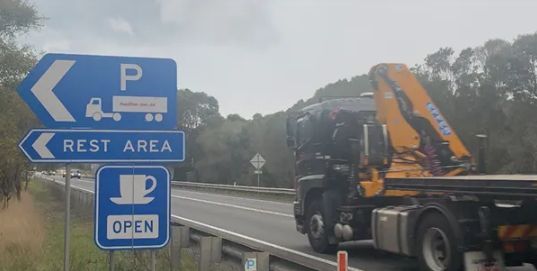What are the Fatigue Management Requirements under the Chain of Responsibility?
What are the Fatigue Management Requirements under the Chain of Responsibility?

Chain of Responsibility
Under the Heavy Vehicle National Law (HVNL) parties in the CoR and under the fatigue management laws - ”a driver must not drive a fatigue-regulated heavy vehicle on a road while impaired by fatigue or in breach of work and rest hour requirements.”
A fatigue-regulated heavy vehicle is:
- A vehicle with a Gross Vehicle Mass (GVM) of over 12 tonnes;
- A combination with a total GVM of over 12 tonnes;
- A bus with a GVM over 4.5 tonnes fitted to carry more than 12 adults (including the driver);
- A truck, or combination including a truck, with a GVM of over 12 tonnes with a machine or implement attached.
Driver Fatigue
Fatigue is a major work health and safety hazard for truck drivers. The Heavy Vehicle Driver Fatigue reforms were introduced in September 2008. These reforms were carried over into the HVNL. The HVNL defines “fatigue” as when you feel:
- sleepy;
- physically or mentally tired, weary or drowsy;
- exhausted and/or lacking in energy; or
- acting in a way consistent with the above.
Work and Rest Hours
Drivers must comply with certain maximum work and minimum rest limits. Parties in the supply chain must do all that is reasonably practicable to prevent drivers from exceeding these limits. Work time refers to the time taken for:
- All driving; and
- Any other task related to the operation of a fatigue-regulated heavy vehicle.
Options for Managing Hours
Due to the wide nature of businesses and industries, there is “no one size fits all” for managing driver work and rest hours. Therefore, the HVNL sets out three options for managing hours that allow for increased flexibility without compromising safety.
The first option is Standard Hours. Standard hours are for drivers and operators not operating under a National Heavy Vehicle Accreditation Scheme (NHVAS) or an exemption. It prescribes the maximum work and minimum rest that can be performed safely without additional safety countermeasures.
Next is Basic Fatigue Management (BFM). BFM is where drivers and operators must be accredited under the NHVAS. This allows for more flexible work hours including up to 14 hours in a 24-hour period.
The third option is Advanced Fatigue Management (AFM). Under AFM drivers and operators must be accredited under the NHVAS. Rather than prescribed work and rest hours, AFM offers flexibility to propose it's own hours based on a risk-based approach to managing fatigue. This is primarily suited to line haul-type operations.
Record Keeping
Under the record-keeping requirements, a driver of a fatigue-regulated heavy vehicle must record their hours in a National Driver Work Diary when they are driving outside a 100km radius from their base under Standard Hours; or when operating under BFM, AFM or an exemption regardless of the distance. A driver is not legally required to use a Work Diary if they always do local work, that is driving only within a 100km radius of their base) under Standard Hours.
Managing Fatigue in your Business
The key elements of Managing Fatigue in your Business include:
- Conducting a risk assessment of operations that may cause a driver to drive while impaired by fatigue or in breach of work and rest hour requirements.
- Documenting fatigue management policies and procedures that outline the control measures.
- Consulting with other parties on how they manage fatigue – for example, request a copy of their fatigue management risk assessment, policies and procedures.
- Conducting regular contract reviews of the effectiveness of controls implemented by others in the supply chain.
- Ensuring contracts and agreements do not contain incentives (for early pick-up or delivery) or penalties (for late delivery) that may cause or encourage the driver to drive whilst fatigued or breach their work and rest hours.
- Ensuring Commercial arrangements include prescriptive requirements to comply with legal obligations.
Zenergy eLearning Program Chain of Responsibility (CoR) for Operational Staff
This online course introduces you to requirements and obligations of Fatigue Management, Speed Compliance and Heavy Vehicle Safety and Roadworthiness, Load Management including Mass and Dimension and Load Restraint as they relate to Chain of Responsibility and the Heavy Vehicle National Law and the key aspects of these risks and how to manage them in accordance with the Heavy Vehicle National Law.
This course includes Module 1. Fatigue Management – Provides an overview of the Heavy Vehicle National Law (HVNL) and Regulations requirements and obligations for Fatigue Management, an introduction to fatigue, recognising the signs of fatigue, and the causes of fatigue, compliance to the work and rest hours requirements.
Click on the following link to review further course details:
Chain of Responsibility (CoR) for Operational Staff
Zenergy – Heavy Vehicle National Law and Chain of Responsibility (CoR)
Zenergy experienced consultants can assist in the development of CoR Transport Safety Management System (TSMS) documentation, conducting independent audits of your Management System documentation for management of transport safety, including Chain of Responsibility (CoR), to ensure it meets your responsibilities under the Heavy Vehicle National Law (HVNL).
For more information on our services feel free to email us at info@zenergygroup.com.au or call 1300 333 400.
Contact Us
Zenergy News






